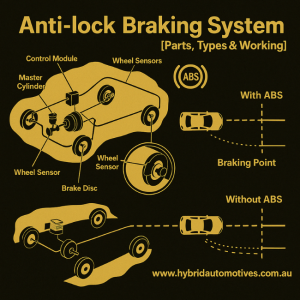Understanding the Role of ABS Pump in Car Brakes
An ABS (Anti-lock Braking System) pump is an essential component of modern vehicles, contributing significantly to road safety. Explore ABS Pumps in detail, explaining how they work, what parts they have, their advantages, common problems, how to take care of them, and advancements in their technology.
Introduction to ABS Pump
In today’s automotive landscape, safety is paramount, and the ABS pump plays a crucial role in ensuring safe braking maneuvers. Essentially, an ABS pump is like a smart brake system. It has a hydraulic part and a control unit that work together to stop your wheels from locking up when you brake. This helps you keep control of your steering and grip on the road.

Components of ABS Pump
An ABS (Anti-lock Braking System) pump consists of several parts that work together to ensure effective braking in vehicles. These components include:
- Hydraulic Unit: The hydraulic unit of the ABS pump is responsible for regulating brake pressure during operation. It has valves and pistons inside that control the pressure of the brake fluid to stop the wheels from locking up.
- Electronic Control Unit (ECU): The ECU is like the ABS’s brain. It processes data from wheel speed sensors and controls the operation of the hydraulic unit to prevent skidding during braking.
- Wheel Speed Sensors: These sensors are placed on each wheel and keep track of how fast the wheels are spinning. The data collected by the wheel speed sensors helps the ECU determine if any wheels are at risk of locking up during braking.
How ABS Pump Works ?
The ABS pump works by checking how fast each wheel is moving all the time. If it notices one wheel is slowing down too much, it changes how hard the brakes press to stop it from locking up while you’re braking. Here’s an easy way to understand how it works:
- Detection of Wheel Speed: The ABS has sensors on each wheel that check how fast they’re spinning. These sensors send information to the ABS control module in real-time.
- Analysis by Control Module: The ABS control module keeps looking at the information it gets from the wheel sensors all the time. If it detects that one or more wheels are decelerating too rapidly, indicating a potential lock-up situation, it activates the ABS.
- Pressure Modulation: Upon activation, the ABS control module signals the ABS pump to modulate brake pressure. It does this by quickly pressing and releasing the brakes on the wheels that need it.
- Prevention of Wheel Lock-up: By adjusting the pressure of the brakes, the ABS pump stops the wheels from locking up. This helps the driver steer the car. This helps the vehicle to maintain traction and stability during braking, especially in slippery or emergencies.
- Monitoring and Adjustment: The ABS continuously monitors wheel speed and adjusts brake pressure as needed throughout the braking process. Once the ABS control module determines that the risk of wheel lock-up has been mitigated, it allows the brakes to function normally again.
Benefits of ABS Pump
The ABS (Anti-lock Braking System) pump offers several advantages that contribute to improved vehicle safety and performance. Here are the key benefits:
- Enhanced Vehicle Control: One big advantage of the ABS pump is that it helps you control your car better when you brake. It stops the wheels from locking up, so you can still steer even if you’re braking hard or driving on a slippery road.
- Reduced Braking Distance: ABS pumps help to reduce braking distance by preventing wheel skidding. By ensuring that the wheels continue to rotate during braking, the ABS system allows the vehicle to come to a stop more quickly, potentially reducing the risk of accidents.
- Prevention of Skidding and Loss of Control: Skidding can occur when one or more wheels lock up during braking, causing the vehicle to slide uncontrollably. The ABS pump prevents this by modulating brake pressure, thereby reducing the likelihood of skidding and loss of control.
- Improved Stability in Emergency Braking: During emergency braking maneuvers, the ABS pump helps to maintain stability and control by preventing wheel lock-up. This lets the driver turn the car away from things on the road while they’re braking, which makes crashes less likely.
- Better Performance in Adverse Conditions: ABS pumps are particularly beneficial in adverse driving conditions such as wet, icy, or gravelly roads. By preventing wheel lock-up, the ABS helps to maintain traction and stability, even when road conditions are challenging.
Common Issues with ABS Pump
While ABS (Anti-lock Braking System) pumps are designed to enhance vehicle safety, they can encounter various issues over time. Understanding these common issues is crucial for maintaining the functionality of the ABS. Here are some of the most frequent problems associated with ABS pumps:
- Sensor Malfunction: The ABS needs wheel speed sensors to work because they tell it how fast each wheel is spinning. Sensor malfunctions, such as dirt accumulation, corrosion, or wiring faults, can lead to inaccurate readings and trigger ABS warning lights.
- Pump Failure: The ABS pump itself can fail due to mechanical issues or electrical faults. Parts inside the ABS pump can get old and worn out, which can make it work less well or stop working altogether. Problems with the electrical system, like broken wires or bad relays, can also make the ABS pump stop working right.
- Electronic Faults: The electronic control unit (ECU) of the ABS may encounter faults or glitches, leading to erratic behavior or complete system failure. Issues with the ECU can arise due to software errors, voltage irregularities, or damage to electronic components.
- Fluid Contamination: Contaminated brake fluid can compromise the performance of the ABS pump and other hydraulic components. Moisture, air bubbles, or debris in the brake fluid can interfere with the operation of valves and pistons within the hydraulic unit, leading to reduced braking effectiveness.
- Brake Fluid Leaks: If there are holes in the hydraulic system, the brake fluid can leak out. This makes the hydraulic pressure lower and might make the ABS pump stop working. Common sources of leaks include deteriorated seals, damaged brake lines, or faulty hydraulic connections.
- Corrosion and Rust: Damage on the outside can happen because of accidents, things hitting the car on the road, or if someone doesn’t handle it right when they’re fixing it. Corrosion can weaken metal components, impairing their functionality and leading to premature failure of the ABS.
- External Damage: Damage to external components of the ABS, such as sensors, wiring harnesses, or hydraulic lines, can impair the overall functionality of the ABS pump. External damage can occur due to accidents, impacts from road debris, or improper handling during maintenance procedures.
Diagnosing ABS Pump Problems
Detecting ABS pump issues requires careful observation of warning lights on the dashboard, listening for unusual noises during braking, and monitoring for irregularities in braking behavior, all of which may indicate underlying problems.
Repair and Maintenance of ABS Pump
Proper maintenance of ABS pumps is essential for ensuring optimal performance and longevity. This means checking it often, changing the fluid when needed, and getting help from an expert if there’s a problem.
ABS Pump Retrofitting and Upgrades
For older vehicles lacking ABS systems, retrofit options are available to enhance safety. Additionally, upgrading ABS technology in newer vehicles can offer improved performance and additional safety features.
Role of ABS Pump in Vehicle Safety
The ABS pump is really important for keeping vehicles safe, especially when you’re braking. Its role in vehicle safety cannot be overstated, as it directly contributes to preventing accidents and enhancing driver control in various road conditions.
- Prevention of Wheel Lock-up: One of the primary functions of the ABS pump is to prevent the wheels from locking up during braking. When you brake suddenly or on a slippery road, the wheels might lock up, making you lose control and slide. The ABS pump modulates brake pressure rapidly, allowing the wheels to continue rotating while braking, thereby preventing lock-up.
- Maintenance of Steering Control: By preventing wheel lock-up, the ABS pump helps drivers maintain steering control even during hard braking. This is particularly crucial in emergency situations where sudden braking is necessary to avoid collisions or hazards on the road. Without ABS, locked wheels could lead to loss of directional stability, making it difficult for the driver to steer away from obstacles.
- Enhancement of Traction: In addition to preventing wheel lock-up, the ABS pump helps maintain traction between the tires and the road surface. By regulating brake pressure on individual wheels, the ABS system ensures that the tires maintain optimal grip, even on slippery or uneven road surfaces. This enhances the vehicle’s stability and maneuverability during braking, reducing the likelihood of skidding or sliding.
- Reduction of Braking Distance: ABS pumps contribute to reducing braking distances by allowing drivers to apply maximum braking force without the risk of wheel lock-up. ABS helps prevent sliding and keeps you in control, so your car can stop faster and safer, especially in emergencies. This helps lower the chances of accidents like rear-end collisions due to not stopping in time.
- Mitigation of Accident Risks: Ultimately, the role of the ABS pump in vehicle safety is to mitigate the risk of accidents by optimizing braking performance and driver control. By preventing wheel lock-up, maintaining steering control, and enhancing traction, ABS pumps help drivers navigate challenging road conditions more effectively, reducing the likelihood of collisions, injuries, and fatalities.
Technological Advancements in ABS Pump
Advancements in ABS pump technology continue to improve safety and performance. Integration with other safety systems, such as traction control and stability control, as well as ongoing innovations, promise even greater safety benefits in the future.
